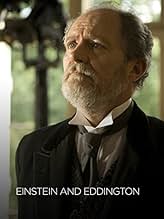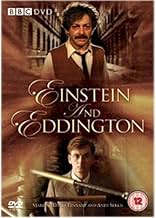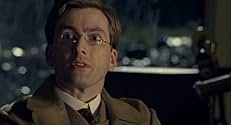Agrega una trama en tu idiomaDrama about the development of Albert Einstein's theory of general relativity, and Einstein's relationship with British scientist Sir Arthur Eddington, the first physicist to experimentally ... Leer todoDrama about the development of Albert Einstein's theory of general relativity, and Einstein's relationship with British scientist Sir Arthur Eddington, the first physicist to experimentally prove his ideas.Drama about the development of Albert Einstein's theory of general relativity, and Einstein's relationship with British scientist Sir Arthur Eddington, the first physicist to experimentally prove his ideas.
- Nominada a1 premio BAFTA
- 5 nominaciones en total
- Tennis Player 1
- (as Ben Uttley)
- Dirección
- Guionista
- Todo el elenco y el equipo
- Producción, taquilla y más en IMDbPro
Opiniones destacadas
The "history" in this movie is not even close, except that Einstein did indeed solve this puzzle. Eddington did not help him or pose the question. Einstein already had the question. They left out key life milestones. Einstein did marry his 1st cousin, right after his divorce from his 1st wife came through, as it had taken a long time (the only thing this got right). The whole Africa thing didn't happen like this nor did the scene where Eddington proved Einstein's theory, and it wasn't in public. I don't expect any movie based on history to be a documentary, but at least get half of it right, not 10%.
The writing was bad TV movie worthy. I cringed for the actors often. The music was just embarrassing. I almost turned it off after the overly majestic opening, as I thought it was a kid's movie. The composer copied the ET score, if not in notes, in theme, mood, and dynamics. And not near as good as the ET score. I am glad that Andy Serkis got a nice leading role after being known as Gollum for so long. But like the other actors, he never got to really shine. He managed the situation better than most of the male ensemble, though. The women did very well, however.
Everything I have read or was told about Arthur Stanley Eddington indicates that he was a painfully shy, genteel, devout Quaker and an active pacifist whose sexual preferences are UNKNOWN. To suppose that Eddington, or any other male for that matter, is a homosexual because they never married or died young, is an exercise in jackass fallacy; probably the most stupid deduction I have ever heard proposed. Such logic would also make every woman who never married or died young a lesbian. This is really dumb thinking, folks.
Other posters and commentators have jumped on dialogue from the movie e.g., Eddington saying to his sister: "I really loved him!" as being prima facie evidence that Eddington admitted to his sister that he was a homosexual. First, for a person to declare that they love someone of the same sex, does not presume they are in a homosexual relationship with that person or that they are homosexual lovers. Second, people forget that these words were never said by Eddington himself and that they are actually just words put into an actor's mouth by a writer or a director. The fact is Eddington's sexual preference is UNKNOWN. It was never mentioned, indicated or hinted at by Eddington, his sister, his other family members, his friends or his colleagues at any time before, during or after his death. I don't understand the logic or rationale that because he never mentioned it, confirms he must be a homosexual. If Eddington was a homosexual it would be most unusual for him not to indicate this in his personal papers because homosexuals almost always leave behind some clear indication, or even proof, of their sexual preference. I cannot think of one homosexual who didn't. And Eddington didn't. Claiming Eddington is a homosexual sounds like just a lot of homosexual wishful thinking to me.
Sadly, this inference in the movie and subsequent debate really deters from the terrific story of Eddington's (definitely heterosexual and academic) relationship with Einstein and the problems he encountered trying to prove Einstein's Theory of General Relativity. This movie would have been more dramatic if the makers had pursued Eddington's (and Einstein's) endeavours to find a repeatable scientific method experiment which would prove the Theory of General Relativity supersedes Newton's Theory of Gravity, as well as providing greater detail of the reactions of the German and English scientists and their inter-relationships with Eddington and Einstein. Eddington's battle with the Royal Society was monumental and went on for many years. Details of the science and the scientific debate would have made a more exciting and interesting movie and far more satisfying than having Eddington's character race his bicycle along a road next to a train, with a strange expression on his face, in order to bid farewell to his (undeclared) lover. It's just silly. While the movie clearly hints at Eddington's alleged homosexuality, it glosses over the Einstein's heterosexual aberration in his courting and marrying his first cousin - she was a first cousin his mother's side and a second cousin on his father's side of the family, a double whammy which gives new meaning to Einstein's relativity! Then again, I'm thankful because it really doesn't belong nor does it add to the real story. If the drama of the scientific debate had been followed more vigorously, instead of raising the homosexuality red herring, this movie would have been better for it and far more interesting. People seem to focus more on Eddington's sexual preferences than his (and Einstein's) genius and their scientific breakthroughs and achievements. And that is a tragedy.
Nevertheless, this is a very good movie that I enjoyed very much despite these shortcomings. Enjoy!
Rating: 4/5 stars
The twin leads British scientist Arthur Eddington (David Tennant) and Einstein (Andy Serkis) lead very different lives but face not only similar scientific opposition and derision but also similar pressures to back their country's efforts to win the First World War. Tennant shakes off the Dr Who expectations in pointing up the problems of a gay pacifist Quaker who tries to prove the new-fangled theories of 'enemy' scientist Einstein a theory especially dangerous because it undermines the ordered view of the universe created by English scientist Isaac Newton. Einstein's complicated private life is compounded by his revulsion at fellow scientists' work in developing poison gas. Both Tennant and Serkis get right into the skin of their characters - two brilliant actors on top form.
The drama brings over very effectively the transition from the comfortable life of the scientists in pre-war Cambridge and Switzerland to the tragedies of war. Jim Broadbent as Sir Oliver Lodge and Donald Sumpter as Max Planck lead the scientific establishments in Cambridge and Berlin as they pervert their scientific beliefs to condone mass killing on a scale never before seen. The main female roles have rather less to do, but Rebecca Hall as Eddington's sister, Lucy Cohu as Einstein's abandoned wife and Jodhi May as his mistress all add an extra warmth to the production and help to avoid the danger of focusing only on clever men using symbols and formulae to bemuse their colleagues (and the audience).
The settings Cambridge, Berlin and West Africa, where Eddington photographed a total eclipse of the sun to prove the Einstein's theory was right provide a powerful backdrop to the human drama, making it all the more believable. All in all, a very successful and informative BBC and HBO drama that maintains tension and excitement throughout.
¿Sabías que…?
- TriviaAlbert Einstein's character is seen throwing his socks upon the crowd on a dock early in the movie. However, he never wore socks into adulthood in real life due to their propensity to make holes in the big toe.
- ErroresOne the night before the total eclipse of the Sun, a full moon is shown in the sky. That is impossible since a solar eclipse can only occur at the time of a 'new Moon', i.e. when the Moon is the opposite to being full.
- Citas
[Einstein is trying to work out why Newton's Laws of Motion do not correctly explain the orbit of the planet Mercury]
Max Planck: May I ask you a very serious question? What if God were to say you were mistaken? If he said "Stop. Newton is right"?
Albert Einstein: Then I would thank God for his point of view, and we would agree to differ, and I would be left feeling very sorry for God.
- ConexionesReferenced in Parkinson: Episode dated 5 May 2007 (2007)
Selecciones populares
Detalles
- Fecha de lanzamiento
- Países de origen
- Idioma
- También se conoce como
- Einstein và Eddington
- Locaciones de filmación
- Fót Studios, Budapest, Hungría(Eddington's office)
- Productoras
- Ver más créditos de la compañía en IMDbPro



































